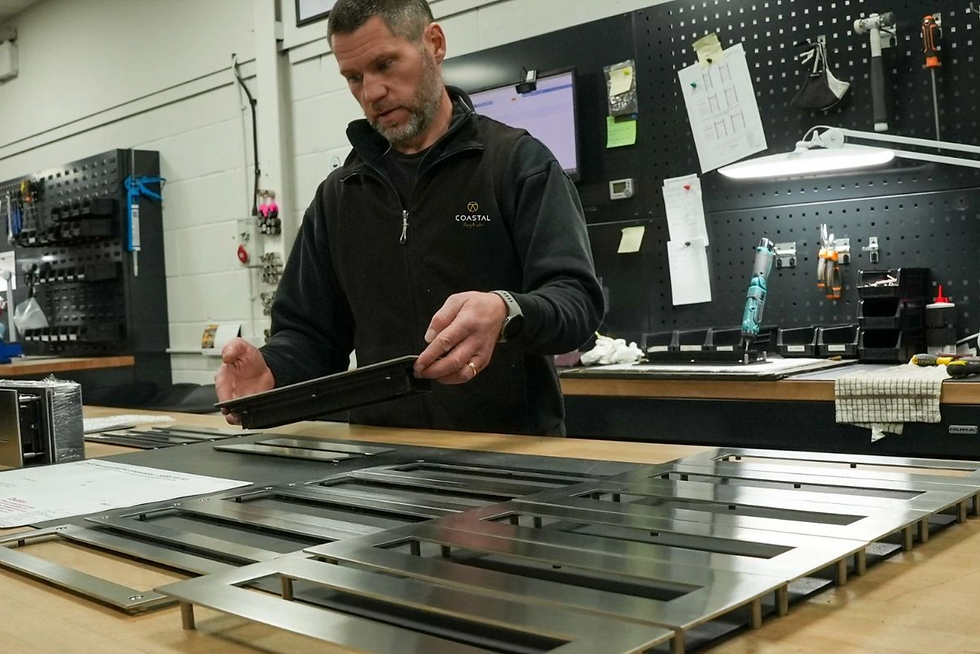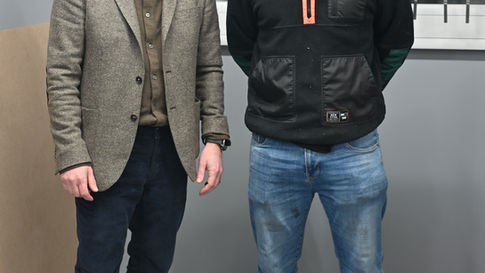Coastal Group explains why 316 marine grade stainless steel isn’t just an option – it’s essential
- Aug 6, 2025
- 3 min read
For any door or window installation near the coast, choosing the correct grade of stainless steel is critical. It’s not simply a matter of appearance – it directly affects long-term performance, protects the integrity of the work and helps prevent costly callbacks just a few winters down the line.
Time and again, lower-grade materials have led to frustrating outcomes: rusted fixings, tea-staining on painted timber, seized hinges and discoloured finishes — issues often traced back to hardware made from unsuitable stainless steel grades.
What sets 316 apart?

316 marine grade stainless steel is engineered for challenging environments, including coastal exposure and urban pollution. Its defining feature is molybdenum, an alloying element not found in standard grades like 304 or 430. With 2-3% molybdenum content, 316 offers significantly greater resistance to corrosion.
This makes it ideal for environments exposed to salt, moisture, wind and airborne pollutants.

Thanks to its molybdenum content, 316 stainless steel resists:
• Pitting corrosion from salt in the air
• Tea-staining that can occur within a single winter
• Crevice corrosion caused by trapped moisture
• Industrial pollution and acidic rainfall
• Surface damage from abrasives or weathering

Why it matters to the final project
High-performance doors – whether timber, composite, aluminium or Accoya – require hardware that performs to the same high standard. Specifying 316 grade stainless steel helps prevent:
• Brown streaks on painted timber
• Corroded springs or internal fixings
• Surface degradation around handles and hinges
• Premature failures after just one season
• Unnecessary callbacks or replacements
In any property within 5 to 10 miles of the coast, or in exposed or industrial areas further inland, 316 stainless steel should be considered the default specification.
The risk of choosing lower grades
While grades such as 304 or 430 may appear adequate when new – shiny, clean and solid – they lack molybdenum and rely on surface plating or passive layers. These finishes often degrade quickly when exposed to salt or scratched.
Without 316, hardware is more likely to:
• Offer only limited corrosion resistance
• Begin corroding from inside, often unnoticed until failure
• Compromise surrounding joinery
• Require replacement or generate complaints
By the time signs of damage appear, the material has usually already failed where it matters most — at the joints, screws or springs.

The LP400: Built for the coast
For coastal and exposed environments, 316 marine grade stainless steel should be used across all hardware – including fixings and fittings.
This is why the LP400 Sleeved Letter Plate has become the trusted choice for joiners, manufacturers and architects working on seafront properties. With a solid 316 stainless steel faceplate and fixings, the LP400 is designed to withstand salt air, moisture and harsh weather without staining or corroding.
From traditional cottages in Cornwall to new-builds in Brighton and heritage projects in Edinburgh, professionals across the UK coastline rely on the LP400 to deliver reliable performance and long-term durability where other letter plates fail.
A guarantee that matches the material
Coastal Group is so confident in the durability of 316 marine grade stainless steel that it’s used throughout the Blu range of external door and window hardware — all backed by a lifetime guarantee.
The LP400 is manufactured in-house at Coastal’s headquarters in Cornwall, where stringent quality checks ensure consistency and dependability on every unit.
Real projects. Real results


The letterplate gallery photos here showcase real customer projects featuring the LP400 installed in some of the UK’s most exposed coastal locations. These installations demonstrate how choosing the right materials — specifically solid 316 marine grade stainless steel hardware — helps protect doors from rust, staining, and early failure. It’s a clear example of how specifying the correct product leads to long-term reliability and satisfied customers.
Built for the coast. Built to last.

Marine environments demand more – and so should the materials used. Specifying 316 stainless steel isn't a luxury but a project-critical standard for long-term protection, performance and customer satisfaction.
The LP400 is a practical example of how the right specification delivers fewer issues, fewer callbacks and better results. Professionals return to it project after project – because it performs where others don’t.
The right spec makes all the difference
To find out more about the LP400 Sleeved Letter Plate or to view the full Blu range of 316 stainless steel hardware, call Coastal Group on 01726 871 025 or visit www.coastal-group.com.






.png)


